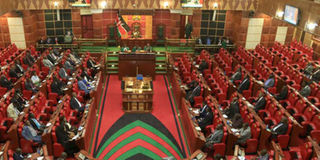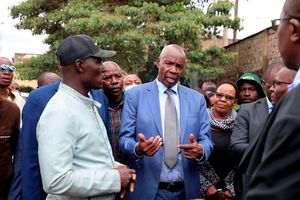Explainer: Women reps are not elected to represent women but as women

Besides the 290 elected MPs and 12 nominated ones, the National Assembly has 47 women reps elected by voters in the counties.
What you need to know:
- The term, when given a literal meaning, assumes that the role mandates the persons who hold the said office to exclusively advocate women’s issues, which is not true.
- Like other MPs, women reps are mandated to represent, deliberate and resolve issues of concern to the people, enact legislation, and exercise oversight over national revenue and expenditure.
In the wake of a distressing surge in femicide across Kenya, women representatives have found themselves under intense scrutiny for their perceived silence on the matter.
In recent weeks, a chorus of voices, notably Kenyans on X (formerly Twitter), has questioned their relevance in the face of escalating violence against women and girls.
Nairobi Woman Representative Esther Passaris bore the brunt of the attack and was even booed away when she attempted to join residents in the nationwide #Endfemicide March.
“Women reps are the reason that march won’t be taken seriously. This day is just like any other. Our women reps have failed,” an X user said.
“We have been saying women reps are a waste of resources in this country. That position should be scrapped immediately,” another user wrote on X.
Not a special interest seat
Nation.Africa spoke with legal and gender experts, who established that contrary to popular belief, the office of woman representative is not a special-interest seat specifically created to address women's issues.
Ms Christabel Eboso, a lawyer and gender expert, states that the office, established under Article 97(1)(b) of the Constitution, is an affirmative action mechanism meant to address the exclusion and marginalisation of women in decision-making.
“Given that it has been argued that the main impediment to gender equality in electoral politics is patriarchy, most gender equality projects involve the implementation of gender quotas through seats such as woman representative to increase the number of women leaders,” she explains.
Ms Eboso adds that like single-constituency members of Parliament (MPs), women representatives are constitutionally mandated to represent, deliberate and resolve issues of concern to the people, enact legislation, and exercise oversight over national revenue and expenditure.
As to whether they have a moral obligation to speak for women, Dr Okumba Miruka, an international gender expert, says all legislators, including male ones, should tackle the plight of women and girls, as that is not a special mandate for women representatives.
“Women representatives were not elected to Parliament to represent women but as women. Some of them are not interested in gender issues.
"They may be interested in finance, environment or governance, so the assumption that they must address gender issues is misleading,” he says.
No feminised roles
Dr Miruka adds that such assumptions lead to feminisation of women legislators’ roles, which could lead to gender issues not being addressed at all.
“The silence over the rise in violence against women should be blamed on all leaders of the country, not just women,” he says.
Nonetheless, he understands why Kenyans expect women representatives to prioritise gender issues.
He says most of them have limited themselves to addressing gender issues such as period poverty, girls’ education, or the plight of persons living with disability.
“The representatives must discuss and conceptualise how they will perform their legislative and oversight roles without limiting themselves to gender issues.
"If some of them are keen on the environment, child rights, agriculture or financial management; they should be free to do so without being accused of not doing their work. That is why they were elected to Parliament,” Dr Miruka adds.
Why then do Kenyans have a stereotypical expectation that women representatives should be at the forefront of championing gender equality?
Dr Miruka says Kenyans presume that women’s and girls’ issues also affect women reps, hence they should speak out against gender-related injustices.
“Being a member of Parliament doesn't prevent you from being battered or killed by your husband. So, women expect them to know and understand where the shoe pinches.
"The expectation is that they should be at the forefront of condemning violence against women,” he says.
Both experts, however, insist that all leaders, even those in the Executive, including the President and his deputy, should speak up against gender-based violence.
They also agree that the title 'woman representative' could also be blamed for Kenyans’ confusion about the mandate of those elected.
“The term, when given a literal meaning, assumes that the role mandates the persons who hold the said office to exclusively advocate women’s issues, which is not true.
"The role of a woman representative is to legislate just like an elected male member of Parliament,” Ms Eboso notes.
This then begs the question that a lot of Kenyans have been pressing on social media: Is the woman representative seat relevant?
According to Dr Miruka, most women representatives have treated their roles as springboard for election to other offices such as governor or single constituency MP.
Also read: The women politicians making a mark
“It is a tactical strategy for women to increase their numbers in Parliament because if some are elected as single-constituency MPs and some are still women representatives, automatically their numbers increase. There is nothing wrong with this,” he says.
Ms Eboso concludes, “While equal voting rights promote equality in democratic participation, it does not necessarily lead to substantive representation of women.
"Affirmative action such as the county woman representative seat allows for gender equality through increasing substantive representation of women in Parliament.”





